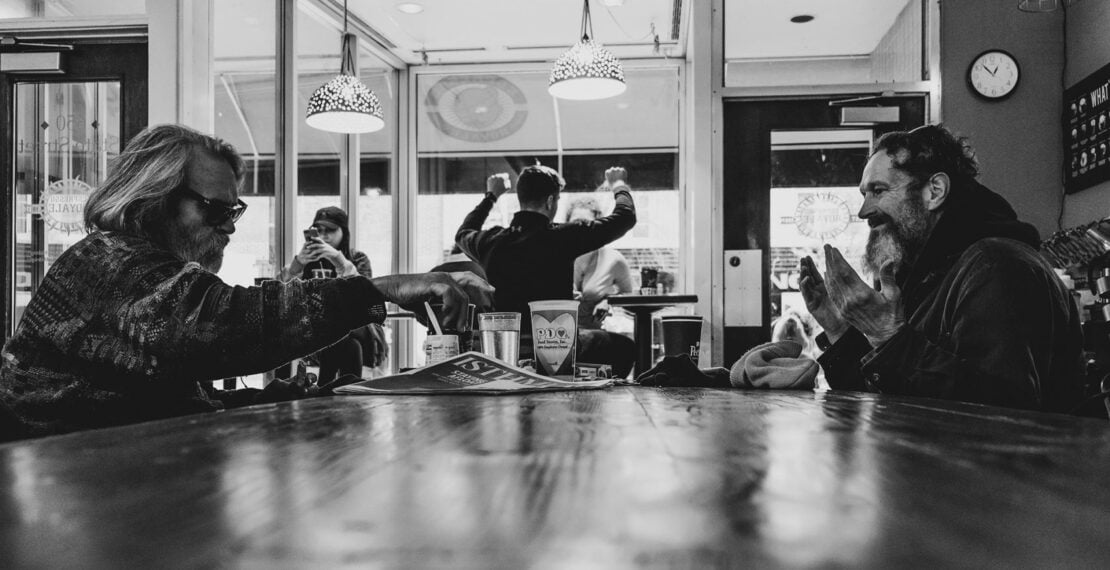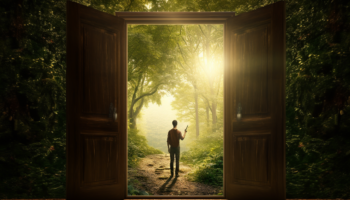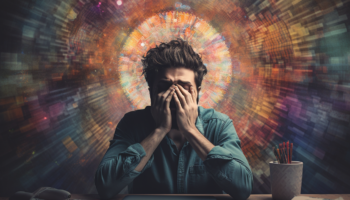I have written this guide to help friends handle many of the objections and hesitations I hear from friends and family members who say, “Yeah, I’d like to try psychedelics because I know they can be an extremely powerful catalyst for change BUT….”
Many reasons follow the ‘BUT,’ and they all come from a decision behavioral theory called ‘Loss Aversion.” Loss aversion refers to a person’s tendency to strongly prefer avoiding losses to acquiring gains. Most studies suggest that losses are twice as powerful, psychologically, as gains.
Loss aversion plays an important role in the decision-making process of trying psychedelics.
In this case, the ‘loss’ is thought of as long-term psychosis and/or having a bad trip. Many people are content with life, and thus, they don’t believe the upside outweighs the possible risks.
Important note:
Some people, no matter how many facts you give them, will not budge on their decision. As emotional creatures, many people don’t have the capacity to make informed decisions based on logic. Their emotional (fight or flight primitive instincts) often get the better of ‘em. It is best to leave these people alone.
Another note: Recently I read the book ‘Ibogaine Explained’ by Peter Frank. At the end of the book, Frank says:
“Ibogaine improved my life dramatically, and I immediately began encouraging all my friends to do a session. I considered giving up my job and becoming a provider. I eventually learned the hard way that ibogaine cannot help everyone. I spent a good deal of my own time and money providing treatments to my friends, only to find that many of them got little benefit. I now know that my transformation with ibogaine was mainly a product of my own desire to change.”
Replace ‘Ibogaine’ with ‘Psychedelics’ and the same rules apply. Those who will get the most value out of psychedelics are those who have a desire or curiosity for more.
Therefore, use this guide carefully. Don’t use it to force someone into psychedelic use. Instead, use the information to allay certain fears for those who are on the fence.
Those who will get the most value out of psychedelics are those who have a desire or curiosity for more.
Listen to our podcast episode with Mike Margolies talking about: The issues within the psychedelic community or Click here to read the transcript
OBJECTION #1: I’M WORRIED PSYCHEDELICS WILL MAKE ME GO INSANE
What you could say:
“You have a legitimate concern. Psychedelics must be used with respect, responsibility, and reverence for they are powerful substances. Diving deep into one’s consciousness is not an exercise for the uninitiated.
But unless you are part of the 1% of human beings who are pre-disposed to schizophrenia, it is extremely unlikely you will develop long-term psychosis as a result of psychedelic use.
While bad trips may lead to short-term psychosis (as long as one week) all symptoms disappear with due time.”
Research: See ‘Prolonged Adverse Reactions to Lysergic Acid Diethylamide‘
So, can psychedelics initiate a psychotic episode in people who have no predisposition to mental illness?
In extremely rare cases, psychedelics can trigger some level of psychosis but ONLY if consumed in an irresponsible manner:
- If the person who consumes the psychedelic does not KNOW they have consumed the psychedelic (This happened in the 1950s and 1960s, most egregiously by the CIA when they ‘spiked’ people without the individuals knowing. Such ‘spikings’ resulted in the occasional death of individuals who thought they had gone insane.)
- If the amount of psychedelic consumed is above and beyond a reasonable level
Such irresponsible consumption most often happens with LSD due to the ease of consuming such large amounts. The threshold dose (or, in laymen terms, the amount of LSD that will cause an individual to ‘trip’) is about 20 micrograms (about 0.00002 grams). A moderate dose of LSD is 100-200 micrograms. An intense dose of LSD is about 400 micrograms (only the extremely experienced should experiment with such high dosages). Psychosis has been brought on, in rare cases, when individuals consume upwards of 1000-10,000 micrograms. If one avoids these extremely high amounts, then there should be no problems.
(To be honest, even these cases of crazy consumption, less than .01% of people have any legitimate chance at triggering long-term psychosis. The human brain is incredibly resilient.)
“It is extremely unlikely you will develop long-term psychosis as a result of psychedelic use.”
OBJECTION #2: I’M WORRIED ABOUT HAVING A BAD TRIP
If you consume a small to moderate dose for your first trip it is unlikely (though, not impossible) that you will have a bad trip.
The best way to ensure you have a good trip is to pay attention to the 6 S’s – especially set and setting.
Back in the 1950s, when scientists first used LSD in experiments, they used it because they thought it did a tremendous job of replicating psychosis.
As a result, many ‘test subjects’ had bad trips.
Why?
Because of two reasons:
- The setting in which the trip occurred: neutral, sanitized hospital rooms, with a ton of ‘alien’ machines and an uncomfortable bed
- The expectations for the trip – the scientists EXPECTED to replicate psychosis, and many of the test subjects knew this before submitting to the test.
As LSD use became more frequent, so did the emphasis on set and setting.
Thought leaders like Timothy Leary, Aldous Huxley, and Ralph Metzner reiterated the importance of ‘Set and Setting’ to every psychedelic user.
Why is set and setting so important? When under the influence of a psychedelic, our brain is more vulnerable. Our psyche opens up to the world around us, allowing it to be duly influenced by incoming messages.
To remain in a relaxed state, it is important that many of these signals are familiar.
Many experts recommend one of two settings for a psychedelic trip:
- In a comfortable room, with a couch, pillows, ample lighting and a generally pleasing aesthetic appeal. Such a setting is ideal for introspective trips.
- In an outdoor setting one knows quite well. Most of my trips have occurred in an outdoor setting, and I’ve enjoyed nearly every one. I often go to the same spot when tripping on psychedelics. Outdoors is better for more of an extroverted trip.
For your mindset, shortened to ‘set’, it is important to be in an open, positive mood.
If you have had a recent string of bad luck, or you just aren’t in the greatest of moods, it is best not to trip on psychedelics.
It is also critical to address many of the myths about psychedelic use – especially the ones about psychosis – before tripping.
Myths around psychedelic use were responsible for many of the bad trips in the 1960s. Initial apprehension of having a ‘bad trip’ actually increases the likelihood of having a bad trip. Dr. Sidney Cohen, a leading LSD researcher in the 1960s, noted this trend in his research paper, “Lysergic Acid Diethylamide: Side Effects and Complications.”
OBJECTION #3: I DON’T THINK THERE ARE ANY BENEFITS TO PSYCHEDELICS
As I said above, if this is the main objection, you are better off not trying to convince the user to try psychedelics.
Instead, ask him or her if they are open to learning more about psychedelics and the potential benefits.
If they say ‘no’, then move on to the next subject.
If they say, ‘yes’ you could recommend a few of the following resources:
- Sam Harris’s essay entitled ‘Drugs and the Meaning of Life’
- From Neurons to Nirvana: Understanding Psychedelic Medicines
- The Psychedelic Explorer’s Guide by James Fadiman
OBJECTION #4: IT IS ILLEGAL, AND I DO NOT WANT TO RISK ANY CRIMINAL BEHAVIOR
If your friend wishes to try psychedelics but they do not wish to risk purchasing it, then it is best to assume that risk for them.
If it is a matter of them not wanting to break the law, then refer to the ‘Don’t Try to Convince Them’ message above. They are not a good candidate for psychedelic use.
“Ask them if they are open to learning more about psychedelics and the potential benefits”
OBJECTION #5: I’M WORRIED ABOUT FLASHBACKS AND LSD BECOMING LODGED IN MY SPINAL CORD
For more on this myth, see these two resources:
As I think of more objections, I will write up short guides to help you in addressing them.
And please, leave comments below to let me know if you hear any common objections, and your advice on handling them.






